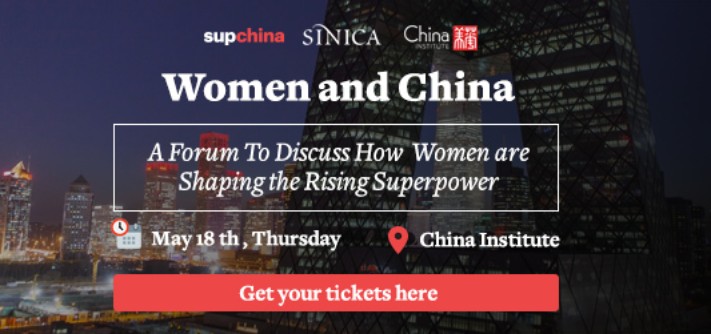Anti-corruption reality TV
Top China news for April 10, 2017. Get this daily digest delivered to your inbox by signing up at supchina.com/subscribe.

Writer of anti-corruption TV series — and insurance regulator — investigated for corruption
Xiang Junbo 项俊波 was a PLA soldier who fought with Vietnamese forces in a border war in 1979 and went on to become a television writer and producer as well as a banker and financial regulator. He became chairman of the Agricultural Bank of China in 2009 before heading up the leadership role at the China Insurance Regulatory Commission. During his TV years, he wrote what Hong Kong newspaper Ta Kung Pao calls (in Chinese) the country’s “first television series about auditing work,” the popular 1986 show The People Will Not Forget (人民不会忘记 rénmín bù huì wàngjì).
The wags who write the headlines at Sina.com have pointed out the irony (in Chinese) that just as the new anti-corruption TV drama In the Name of the People (see below for more) is becoming a hit, Xiang is starring in his own “reality TV version.” In a one-line statement (in Chinese) yesterday, the anti-corruption task force Central Commission for Discipline Inspection said that Xiang was being investigated for “severe violations of discipline.” The New York Times reports (paywall) that the news is “throwing doubt over an industry that has been behind a wave of blockbuster global deals but has raised concerns about financial risk.”
Xiang was connected with an investigation into impropriety when American authorities opened an inquiry into whether the bank JP Morgan Chase was hiring “children of powerful Chinese officials to help it win lucrative business.” In 2012, Xiang had met the chief executive of JPMorgan Chase, and “asked him to hire a young woman who he said was the daughter of a close friend.” The bank settled the case for $264 million, but the Times says Xiang was not accused of wrongdoing, and there is no indication whether that case is relevant to the new Chinese investigation.
Negative images of women in hit anti-corruption TV show
In the Name of the People (人民的名义 rénmín de míngyì), mentioned above, is China’s new Party-backed hit TV series that echoes the anti-corruption campaign initiated by President Xi Jinping. The show is clearly male dominated, as you can instantly tell from its promotional poster pictured above. The few female characters in the drama don’t depict positive roles for women, either:
- Gao Xiaoqing 高小琴, a wealthy entrepreneur with a pretty face, is unable to escape the fate of being a mistress of not one but two senior officials.
- Lu Yike 陆亦可, head of the anti-corruption department, faces constant nagging to get married from her parents and even her subordinates at work.
- Zhong Xiaoai 钟小艾, deputy director of the Central Committee of Discipline Inspection, holds a higher position than her husband, yet she still needs to do most of the housework.
The All-China Women’s Federation has responded to the negative characterization of women in the TV show by calling for an immediate correction of women’s images in literary and artistic works: “Due to these works, years of efforts to promote the idea of gender equality will become fruitless,” the organization wrote (in Chinese) on Weibo. However, even if TV shows start projecting more positive images of women, the political reality is that there are very few women in positions of power in the Chinese government: See this article on the issue by the scholar Cheng Li.
Chinese gun tourists
USA Today reports that there is a growing demand by wealthy Chinese tourists for rifle ranges and gun clubs in the U.S. The article features Dickson Wong, who “arranges tours for groups of…Chinese gun enthusiasts to travel to DeSoto County, Florida, so they can shoot at firing ranges.” Wong plans to open his own gun club in 2019 to cater to the demand. You can see excerpts from Wong’s promotional video in this USA Today clip.
Jeremy Goldkorn—Editor in Chief
Women in the government
Today on The China Project, we publish an article by Brooking Institution senior fellow and scholar of Chinese politics Cheng Li on the dire state of female representation in the Chinese government.
This issue of the The China Project newsletter was produced by Sky Canaves, Lucas Niewenhuis, Jia Guo, and Jiayun Feng. More China stories worth your time are curated below, with the most important ones at the top of each section.
BUSINESS AND TECHNOLOGY:
China-U.S. trade war averted with ‘100-day plan’
Chinese President Xi Jinping and U.S. President Donald Trump met for the first time last week at Trump’s private club Mar-a-Lago in Florida. Video has circulated of Ivanka Trump’s daughter singing in Chinese to Xi and his wife, Peng Liyuan. More importantly, the Financial Times reports (paywall) that a trade war has been averted thanks to a “100-day plan” aimed at addressing trade imbalances between China and the U.S.
While the details of the plan are still being worked out, they are likely to include a range of sectors, from agricultural imports to foreign investment, with the goal of increasing U.S. exports to China and reducing the $347 billion trade deficit in goods. Wilbur Ross, the American commerce secretary, said that Chinese officials had agreed on the need for a more balanced trade relationship in part because of the concern about dangerous financial imbalances. “They expressed an interest in reducing their net trade balance because of the impact it’s having on money supply and inflation,” Ross said. “That’s the first time I’ve heard them say that in a bilateral context.” Prior to the meeting and on his campaign trail, Trump claimed that he would start a trade war with China, adding that China and Mexico “are killing” the U.S. Relations are likely to remain complicated by concerns about Chinese investment in U.S. semiconductor and other technology companies that could be a threat to the U.S. economy.
- Trump has China-owned Volvo to thank for lone new U.S. car plant / Bloomberg
- Opinion: The most important economic challenge that China poses / Washington Post
- China emphasizes commercial ties with U.S. on Alaska stopover / NYT (paywall)
- China’s HNA offers to buy Singapore’s CWT for $1 billion / Reuters
- Casinos, booze, and watches: China’s vice stocks are back / Bloomberg
- When solar panels became job killers / NYT (paywall)
POLITICS AND CURRENT AFFAIRS:
Booming coastal cities at risk from climate change
A 2016 World Bank report said (see page 84) that Guangzhou is the world city that faces the most serious economic risks from climate change, while Shenzhen is ranked 10th. On the weekend, the New York Times published a report (paywall) on the growing threat faced by China’s southern coastal boom cities from floods and rising waters. In a downpour in May 2014, in the manufacturing hub of Dongguan, “more than 100 factories and shops were inundated” as “water climbed knee-high in 20 minutes.” At the same time in nearby Guangzhou, “helicopters and a fleet of 80 boats had to be sent to rescue trapped residents,” while “tens of thousands lost their homes, and 53 square miles of nearby farmland were ruined.” The Times notes that “researchers say there is abundant evidence that the effects of climate change can already be seen — in higher water levels, increasing temperatures and ever-more severe storms.”
- Xi Jinping’s goal eludes him in the U.S. / Nikkei Asian Review
- What Chinese news reports tell us about Beijing’s view of Trump / NYT (paywall)
- China, South Korea discuss more sanctions on North Korea amid talk of Trump action / Reuters
- At strategic shoal, China asserts power through control, and concessions / Reuters
- Whistle-blowers wanted: Beijingers urged to report foreign spies for up to 500,000-yuan reward / SCMP
- Wife of detained Taiwanese activist barred from boarding flight to mainland China / SCMP
SOCIETY AND CULTURE:
‘Empty-nest youths’ living alienated in Chinese cities
A new report (in Chinese) by China National Radio reveals that China now has a massive population of more than 20 million “empty-nest youths” (空巢青年 kōng cháo qīngnián) aged 20 to 30, mostly residing in first-tier cities such as Beijing, Shanghai, Shenzhen, and Guangzhou. Originally coined to describe elderly people who live alone while their children are away, the term “empty nest” is now being applied to solitary young folks working in major cities who are away from their hometowns.
The report also suggests that this group of young empty-nesters are very likely to experience greater life pressure than their non-migrant peers, as living in major cities comes with a hefty price tag: A big chunk of their salaries is usually spent on housing and food, making their personal lives largely confined to their rented apartments. Many of them lack a sense of belonging, which sometimes leads them to overly rely on virtual communications through social networks.
- Inside the world’s largest higher education boom / The Conversation
- Amid the Spanish moss of Florida, a treasure trove of Chinese literature / NYT (paywall)
- Meteorite finder fights China’s (mostly) terrestrial property law / NYT (paywall)







